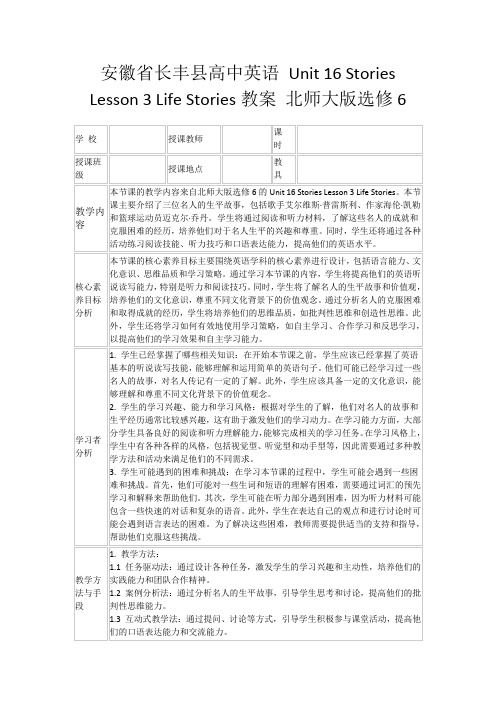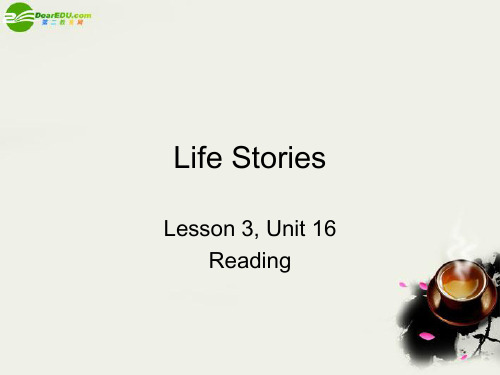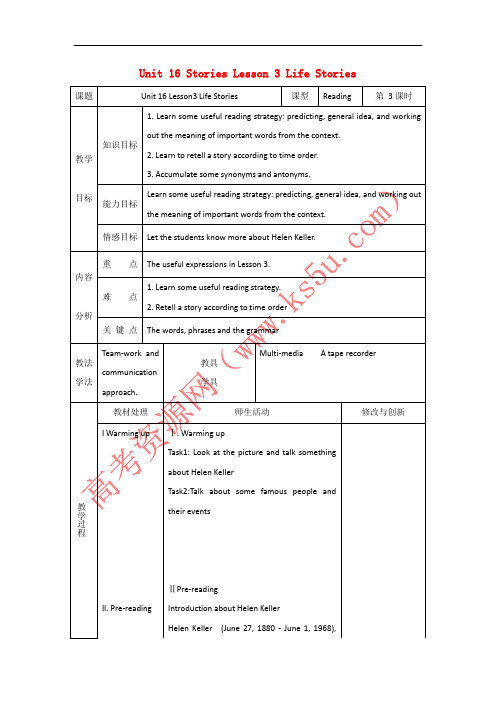安徽省长丰县高中英语Unit16StoriesLesson3LifeStories教案北师大版选修6
高中英语 Unit 16 Stories—Lesson 3《Life Stories》学案 北师大版选修6

M6 U16-L3-1 Helen Keller (Reading)Word bank: adjectivesAdj. that are used todescribe Helen Adj. that are used todescribe AnneOther new wordsI. Fast reading: Read the text quickly and decide what the text is about. • How she learned words • Her college education • Her family background • Her teacher• Her achievementsII. Read the first two paragraphs and answer the following questions:How was Helen Keller different from other children?What do you know about Anne Sullivan?III. Supplementary reading: Helen ’s desire to communicateIV. Scan the text (para. 3-12) and find out the words Helen learned and whichV. Read the text and work in pairs to find out how Anne Sullivan taught the words to Helen. Fill in the blanks with words or phrases.VI. Read Para.3&4 again and fill in the chart in pairs.Word bank: adjectivesAdj. that can express positivefeelingAdj. that can express negative feelingAnne Sullivan let Helen ______________ the doll and ________ the letters __________________.Anne let water ________ one of Helen ’s hands and ________ the letters into the other hand. Helen had a _________________.Anne _____ her arm ______ round Helen. She ____ Helen _____ to her and pointed to ______________.“Think” was also difficult but Helen had ______________. When Helen ___________ her mistakes when making necklaces, Anne _______ Helen ’s head and _______ “think ” into her hand.______________________________After Helen asked again if love was __________, Anne told her that love could not be ___________ but she could _______________________ of love.I. Use the following words to describe what happened in the video clips. “doll”“water”II. Read paragraph 7-9 and answer the following questions: What did Helen think ‘love’ was at first?Why was the word “love” so difficult for Helen to understand?How did Helen feel when she couldn’t understand “love”?III. Read paragraph 10-12 and answer the following questions: How did she learn the word “think”?How did Anne explain “love”?IV. Read Para.7-12 and fill in the chart in pairs.V. Find out adjectives or phrases that are used to describe the following: Helen’s learning process and results (Para. 5-adj.)Helen’s feeling when she didn’t understand the meaning of “love” (Para. 9-adj.)Helen understood the meaning of “think” suddenly (Para. 10-phrases)The moment when Helen finally under stood the truth of “love” (Para. 12-adj.)VI. Decide which of them are used to describe the process of learning the words “think”and “love”and write down the numbers into the correct box. Use them to describe how Helen learned “think” and “love”:1) had a breakthrough 2) drew me closer3) pointed to my heart 4) in a flash5) put her arm gently round…6) pointed up to7) vivid moment 8) uncertain about9) touched… head 10) feel the sweetness11) confused and disappointed。
高中英语北师大版必修6 Un16《Lesson3 Life Stories》省级名师优质课教案比赛获奖教案示范课教案公开课教案

高中英语北师大版必修6Unit16 Stories《Lesson3 Life Stories》省级名师优质课教案比赛获奖教案示范课教案公开课教案【省级名师教案】1教学目标1. 1.Help students have a better understanding of the story。
2. 2.Enable students to learn about the process of Helen Keller' language study.3. 3.Help students experience Helen Keller's life and improve their ability to describeemotions and attitudes.4. 4.Practice skimming and scanning skills.2学情分析Some students can use simple sentences to give their opinions, but it will be difficult for them to get detailed information . Some students will feel difficult to talk about the story with their partners because of their poor spoken English. So I will show a chart on the s lide and give enough background information to help all the students.3重点难点1.Give students enough background information and help them understand the text well.2.How to improve the students' reading ability.4教学过程4.1Lesson 3 Life Stories教学活动1【导入】Lead-inTask 1:Show some photos of Helen Keller and discuss briefly with the students about w hat they have known about her.Intentions(意图): 调动学生已有知识,带出blind, deaf, severe restrictions等单词。
2020学年高中英语Unit16StoriesSectionⅢLesson3LifeStories

2019-2020学年高中英语Unit 16 Stories Section ⅢLesson 3 Life Stories课后限时训练北师大版选修6编辑整理:尊敬的读者朋友们:这里是精品文档编辑中心,本文档内容是由我和我的同事精心编辑整理后发布的,发布之前我们对文中内容进行仔细校对,但是难免会有疏漏的地方,但是任然希望(2019-2020学年高中英语Unit 16 Stories Section ⅢLesson 3 Life Stories课后限时训练北师大版选修6)的内容能够给您的工作和学习带来便利。
同时也真诚的希望收到您的建议和反馈,这将是我们进步的源泉,前进的动力。
本文可编辑可修改,如果觉得对您有帮助请收藏以便随时查阅,最后祝您生活愉快业绩进步,以下为2019-2020学年高中英语Unit 16 Stories Section ⅢLesson 3 Life Stories课后限时训练北师大版选修6的全部内容。
Section Ⅲ Lesson 3 Life StoriesⅠ.单词拼写1.The government placed many restrictions (限制)on foreign trade。
2.The company has expanded (扩大)its operations in Scotland by building a new factory there。
3.You should make the best of every precious (宝贵的)minute to study。
4.It is apparent (明显的)to us that he hasn't done his work properly。
5.It is uncertain (不确定的)what side effects the medicine will bring about.6.Loneliness in a gloomy raining day may be unbearable to him。
安徽省长丰县高中英语Unit16StoriesLesson3LifeStories教案北师大版选修6

-学生总结故事内容,并分享自己的观察。
-然后,我会让学生思考:“我们从这些名人的故事中学到了什么?如何将这些价值观应用到自己的生活中?”
-学生思考并分享自己的观点和体会。
教学资源拓展
六、教学资源拓展
1.拓展资源
-名人生平纪录片:推荐学生观看关于艾尔维斯·普雷斯利、海伦·凯勒和迈克尔·乔丹的纪录片,以更深入地了解他们的生活和成就。
-开始上课时,我会以一个问题引起学生的兴趣:“你们知道哪些名人?他们为什么出名?”让学生分享他们所了解的名人故事。
-学生会回答他们所知道的名人,如科学家、运动员、艺术家等,并简要介绍他们的成就。
2. Pre-reading
-接下来,我会介绍本节课的主题:“今天我们将会学习三位名人的生平故事,他们是歌手艾尔维斯·普雷斯利、作家海伦·凯勒和篮球运动员迈克尔·乔丹。你们对他们的故事有什么期待?”
学习者分析
1.学生已经掌握了哪些相关知识:在开始本节课之前,学生应该已经掌握了英语基本的听说读写技能,能够理解和运用简单的英语句子。他们可能已经学习过一些名人的故事,对名人传记有一定的了解。此外,学生应该具备一定的文化意识,能够理解和尊重不同文化背景下的价值观念。
2.学生的学习兴趣、能力和学习风格:根据对学生的了解,他们对名人的故事和生平经历通常比较感兴趣,这有助于激发他们的学习动力。在学习能力方面,大部分学生具备良好的阅读和听力理解能力,能够完成相关的学习任务。在学习风格上,学生中有各种各样的风格,包括视觉型、听觉型和动手型等,因此需要通过多种教学方法和活动来满足他们的不同需求。
3.学生可能遇到的困难和挑战:在学习本节课的过程中,学生可能会遇到一些困难和挑战。首先,他们可能对一些生词和短语的理解有困难,需要通过词汇的预先学习和解释来帮助他们。其次,学生可能在听力部分遇到困难,因为听力材料可能包含一些快速的对话和复杂的语音。此外,学生在表达自己的观点和进行讨论时可能会遇到语言表达的困难。为了解决这些困难,教师需要提供适当的支持和指导,帮助他们克服这些挑战。
高二英语 模块6 Unit 16 Lesson 3 Life Storiesreading第一课时课

Skim the rest of the text quickly and
reorder these words according to when
Helen learn them.
• doll
• doll
• water
• love
• love
Байду номын сангаас
• think
• think
• water
What is the difference bet•weelon vthee two pairs of words:
time)
“love” was beautiful. her own feelings.
Combine the information in the graph
and the chart above, and work in groups
to retell the story with the key words
think
like the sun … cannot touch … sweetness …
beautiful
love
Mistakes … head … spell …
first time … abstract
• What do you think happened later to Helen Keller?
____p_la_y__w_i_th____ the doll and __sp_e_l_le_d__ the letters into __h_e_r_h_a_n_d__________.
Anne let water ___f_lo_w___ over one of ______H_e_l_e_n_’s_h_a_nadnsd _____s_p_e_ll_e_d the letters into
安徽省长丰县高中英语 Unit 16 Stories Lesson 3 Life Stories教案

2. Why was her teacher so important to her?
3. How did she learn new words?
4. Why did she feel happy when she understood the meaning of the word “water”?
ⅢReading
Task1: Reading strategy (1)
Before reading, look at the title, pictures and the first couples of lines of the text.
Look for clues to help you predict what kind of text it is and what it is about.
ⅡPre-reading
Introduction about Helen Keller
Helen Keller (June 27, 1880 - June 1, 1968),was an author, lecturer, and humanitarian whose unusual life and dedicated献身的work had an international influence on the lives of the disabled (残疾人). She became blind and deaf at the age of 19 months through a damaging brain fever and could communicate only through hysterical歇斯底里laughter or violent tantrums发怒. But, with the help of her teacher Anne Mansfield Sullivan, Keller learned to read barilla盲文and to write by using a special typewriter. Bibliography自传: Keller, Helen, The Story of My Life and Teacher (1955); Waite, H. E., Valiant Companions: Helen Keller and Anne Sullivan Macy (1959)
201X_202x学年高中英语Unit16StoriesSectionⅢLesson3LifeSto
5.restriction E.happening slowly
6.former F.limit
7.apparent G.too unpleasant or painful to bear
8.superb H.an important new discovery
9.unbearable plicated
编辑课件
7
一二三四五六
2.Which of the following statements is NOT right? A
A.Before seven years old,Helen could communicate with her parents
in simple language.
B.Anne Sullivan had some teaching experience before she came to teach Helen.
编辑课件
9
一二三四五六
六、完成下面的课文缩写,特别注意动词的形式
Helen Keller was a great 1. writer (write)and educator in the world,2. whose most famous work is The Story of My Life.
编辑课件
6
一二三四五六
五、根据课文内容选择正确答案 1.From the passage we can know that B . A.Helen knew well on how to learn abstract(抽象的)words B.Helen had some difficulty learning words that she couldn’t touch C.Helen gave up trying when she couldn’t understand the meaning of “love” D.Helen could learn language as easily as children who could see and hear
高中英语课时3Unit16StoriesPeriodThreeLesson3LifeStories
incident. 6.I
am eager to
have an iPhone Ⅹ. Can you
give one to me as a birthday present, Dad?
2021/4/17
高中英语课时
9
3Unit16StoriesPeriodThreeLesson
Ⅴ.完成句子 1. While in London
to see the children. has→had
2021/4/17
高中英语课时
7
3Unit16StoriesPeriodThreeLesson
Ⅳ.选词填空 now that, in common, open up, relate to, be eager to, bring in
1.All the mothers can relate to
foreign trade.
2021/4/17
高中英语课时
5
3Unit16StoriesPeriodThreeLesson
5.It is uncertain (certain) what side effects the medicine will
bring about.
6.Loneliness in a gloomy raining day may be unbearable
that they don't want to.
3.Now that the fog is clearing, you can see the mountain
in the distance.
4.The government placed many restrictions (restrict) on
2019_2020学年高中英语Unit16StoriesSectionⅢLesson3LifeStories练习(含解析)北师大版选修6
Section Ⅲ Lesson 3 Life Stories一、根据句意及首字母或汉语提示,填写单词1.It is foolish to waste one’s p time.2.We all know that most metals e when heated.3.In f times we crossed the river by boat,but now we drive over the new bridge.4.Life is u ;he has lost heart finally.5.He is as s as a donkey.6.It is(显然)to all that the driver is to blame for the accident.cation is a (逐渐的) process.8.The naughty boy is really (烦人的).9.It was found at the (准确的)spot where he had left it.10.He is a (直率的)man;just trust him.二、单句语法填空1.—Hurry up!Don’t have the car (wait)at the gate.—I’ll be ready after I have my son (dress).2.—Do you know London at all?—No,this is the first time that I (be)here.3.The sale of alcohol is restricted people over the age of 18.4.I was wondering what to do with my car which couldn’t start a kind man offered to help.5.—It is no use having ideas only.—Don’t worry.Peter can show you to turn an idea into an act.6.The rocks (gradual)wears away due to the action of the water.7.She was stubborn and angry,and often broke things when she(not understand).’t understood8.Helen would have to learn to understand words (spell)on her hand.9.This soon led her (discover)more complex words and changed her (think)processes.10.(try) to learn the word “love” was an experience that she remembered well.11.Is love the (sweet)of flowers?12.Helen then felt the (warm)of the sun (shine)on them.三、完成句子1.由于她在交流方面有诸多严重的限制,海伦的行为常常令人难以忍受。
英语:Unit 16《Stories》课件-Lesson3 Life Stories(北师大版选修6)
Life Stories
Helen Keller
Helen Keller’s Autobiography
Helen Keller (June 27, 1880 - June 1, 1968), was an author, lecturer, and humanitarian (献身的 献身的) whose unusual life and dedicated (献身的) work had an international influence on (残疾人 残疾人). the lives of the disabled (残疾人). She became blind and deaf at the age of 19 months through a damaging brain fever and could communicate only through (歇斯底里 歇斯底里) hysterical (歇斯底里) laughter or violent tantrums (发怒). But, with the help of her (发怒). 发怒 teacher Anne Mansfield Sullivan, Keller braille(盲文 盲文) learned to read braille(盲文) and to write by using a special typewriter.
Ex 3 Find words in the text that have the same meaning as the words in brackets.
1—severe 3—eager 5—restrictions 7—apparent 2—precious 2— 4— 4—straightforward 6— 6—former
- 1、下载文档前请自行甄别文档内容的完整性,平台不提供额外的编辑、内容补充、找答案等附加服务。
- 2、"仅部分预览"的文档,不可在线预览部分如存在完整性等问题,可反馈申请退款(可完整预览的文档不适用该条件!)。
- 3、如文档侵犯您的权益,请联系客服反馈,我们会尽快为您处理(人工客服工作时间:9:00-18:30)。
Unit 16 Stories Lesson 3 Life Stories
课题Unit 16 Lesson3 Life Stories 课型Reading 第3 课时
1. Learn some useful reading strategy: predicting, general idea, and working
out the meaning of important words from the context.
知识目标
2. Learn to retell a story according to time order.
教学
3. Accumulate some synonyms and antonyms.
Learn some useful reading strategy: predicting, general idea, and working 目标
能力目标
out the meaning of important words from the context.
情感目标Let the students know more about Helen Keller.
重点The useful expressions in Lesson 3.
内容
1. Learn some useful reading strategy.
难点
2. Retell a story according to time order
分析
关键点The words, phrases and the grammar
Team-work and Multi-media A tape recorder
教法教具
communication
学法学具
approach.
教材处理师生活动修改与创新
I Warming up Ⅰ. Warming up
Task1: Look at the picture and talk something
about Helen Keller
Task2:Talk about some famous people and
教
their events
学
过
程
ⅡPre-reading
II. Pre-reading Introduction about Helen Keller
Helen Keller (June 27, 1880 - June 1, 1968),
was an author, lecturer, and humanitarian
whose unusual life and dedicated 献身的
work had an international influence on the
lives of the disabled (残疾人). She became
blind and deaf at the age of 19 months
through a damaging brain fever and could
communicate only through hysterical 歇斯底
里laughter or violent tantrums 发怒. But,
with the help of her teacher Anne Mansfield
Sullivan, Keller learned to read barilla 盲文
and to write by using a special typewriter.
Bibliography 自传: Keller, Helen, The Story of
My Life and Teacher (1955); Waite, H. E.,
Valiant Companions: Helen Keller and Anne
Sullivan Macy (1959)
ⅢReading
Task1: Reading strategy (1)
Before reading, look at the title, pictures and III. Reading the first couples of lines of the text.
Look for clues to help you predict what kind of
text it is and what it is about.
Reading strategy (2)
Read the text to get the general idea.
Ignore words you don’t know.
Read the text again. Try to work out the
meaning of important new words. Use a
dictionary if you can’t.
Read any comprehensive questions and try to think of possible answers. Then find answers to questions in the text.
Task2: read the text and answer the following questions:
1. How was Helen Keller different from other children?
2. Why was her teacher so important to her?
3. How did she learn new words?
4. Why did she feel happy when she understood the meaning of the word “water”?
5. Why was the word “love”so difficult for Helen to understand?
6. Why did she think that love might be the sun?
7. How did she learn the word “think”?
8. What do the words “love” and “think” have in common?
Task3: retell the story according to the clues Can you figure out the whole process of Helen’s learning ?
Some of the clues are given here:
1. getting to know Sullivan …getting
2. to know some words which can be touched…
3. the mystery of language was revealed to her …
4. getting to understand some abstract words.
ⅣPost-reading
Discussion:
What kind of teacher do you think Anne
Sullivan is?
Try to use as many adjective words as you can: IV Post-reading
V. Language points
1.feel +名词,感到某事情感或触摸到某物。
He felt no shame and no regret .
Feel = adj 感觉到怎样. 摸上去如何
Feel lonely
V. Language The cloth feels very soft .
points 2. Only 引导的状语从句如放在句前,后面
的句子要部分倒装。
Only by changing the way we live can we save
the earth .
3. Reveal
①展现,显露出Little by little he revealed his
ambitions.渐渐地,他暴露出他的野心。
②揭示,揭露;暴露;泄露
He revealed the secret by accident.他不小心
泄漏了这个秘密。
Further investigation revealed that he was
guilty.进一步侦查表明他是有罪的。
板书设计
教学反思。
